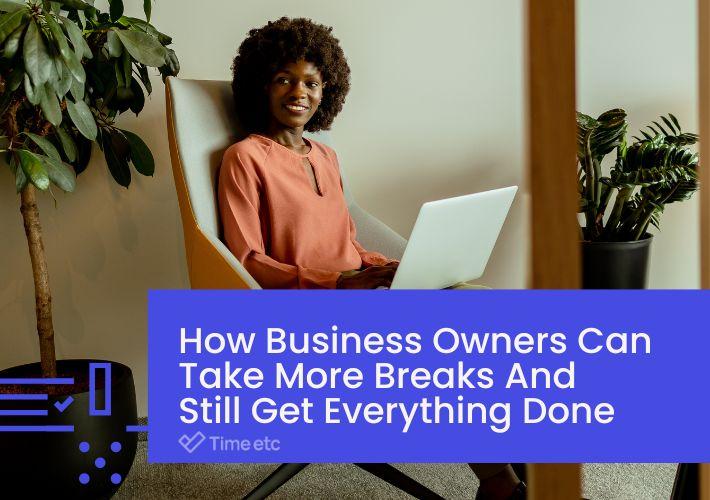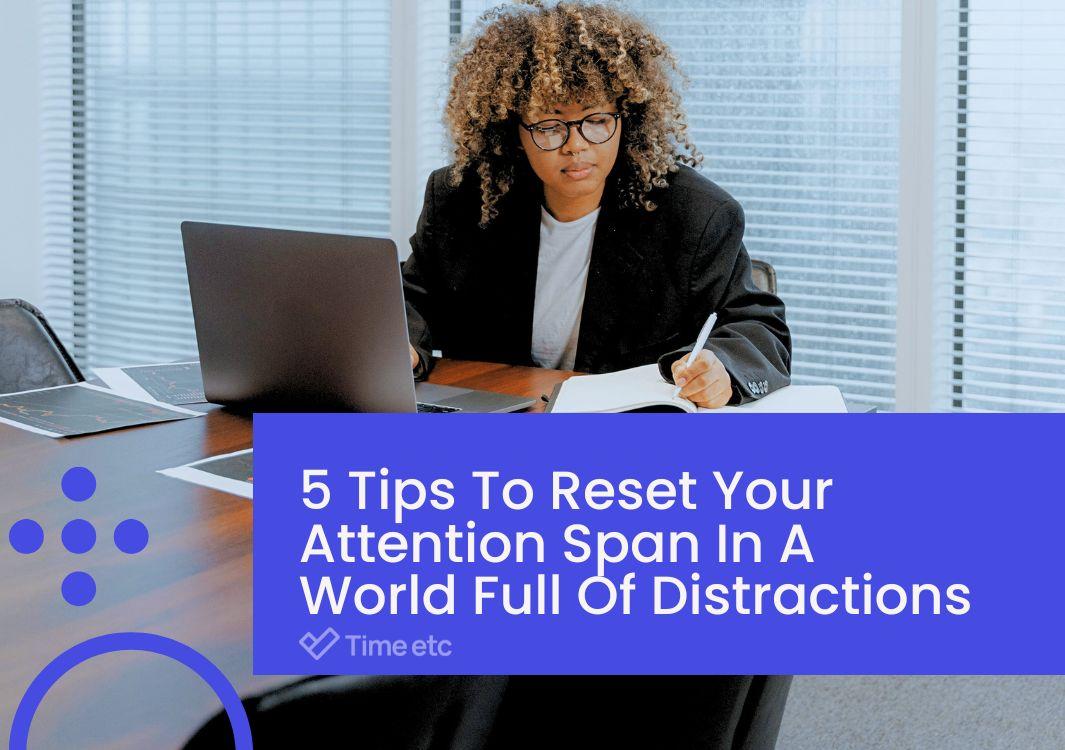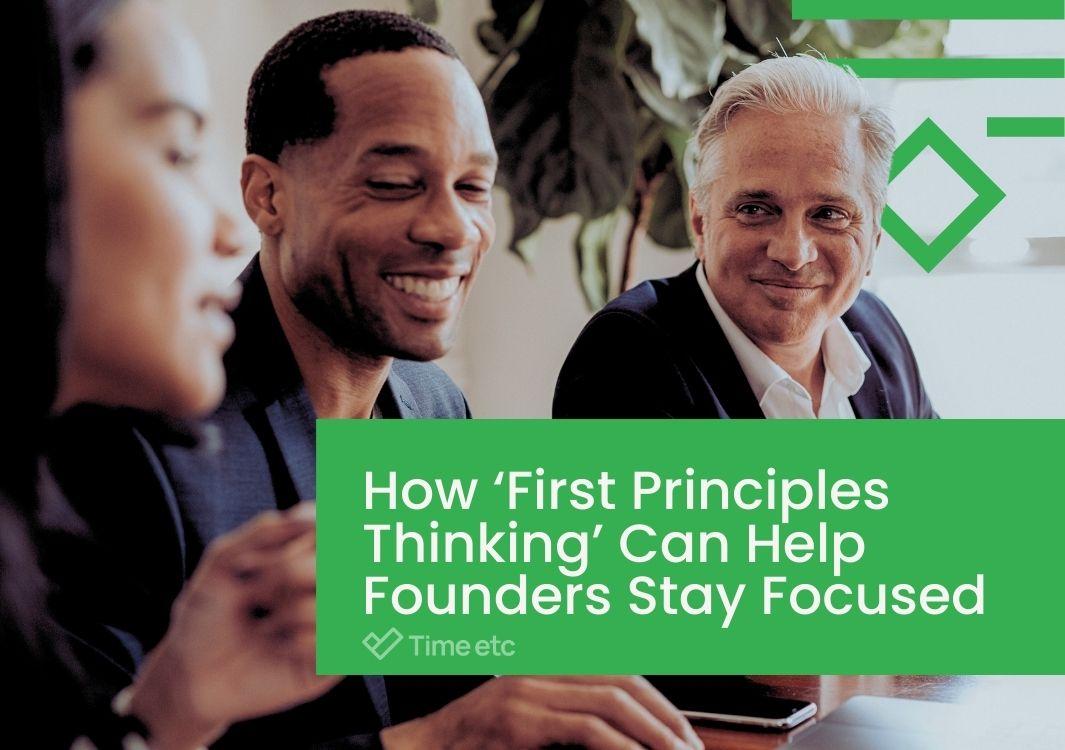As an entrepreneur, it’s easy to fall into the trap of believing that the more hours you work, the more productive you’ll be. After all, there are never enough hours in the day to tackle your ever-growing to-do list. From responding to emails and attending meetings to strategizing for the future, it feels like you’re always on the clock.
But we cannot forget that this “always-on” mentality can take a serious toll, with burnout, diminished creativity, and a disrupted work-life balance all being common consequences. In truth, taking regular breaks is not just beneficial—it’s essential. Pausing to recharge helps you maintain your energy, focus, and overall well-being, allowing you to be your best self both at work and in your personal life.
Whether you’re a solopreneur or leading a growing team, here’s how to reclaim your time and enjoy your entrepreneurial journey more.
Why aren't business owners taking breaks?
Business owners often struggle to take regular breaks due to a combination of psychological factors and practical challenges. Let’s explore some of the key reasons why entrepreneurs have difficulty stepping away from their work.
Productivity guilt and anxiety
One major reason business owners avoid taking breaks is the feeling of "productivity guilt." If you've ever felt ashamed or anxious when you're not working, worrying that you're wasting time or that you could be "doing more", that's productivity guilt rearing its ugly head.
This comes from the belief that your value as a business owner is directly linked to how productive and busy you are. Any time spent not actively working can feel like a betrayal of this entrepreneurial spirit. This guilt can be crippling, making it almost impossible to truly disconnect and recharge.
Unrealistic expectations and "hustle culture"
The entrepreneurial world is also heavily influenced by the “hustle culture” that glorifies working around the clock. Business owners may set unrealistic expectations for themselves, believing that the more hours they put in, the more successful they’ll become.
Business owners may also feel that taking breaks will make them appear lazy or less committed to their goals, leading them to push themselves to the brink of burnout.

Blurred boundaries and overwhelming responsibilities
Besides the psychological aspects, there are practical challenges that add to the struggle business owners face when trying to take breaks. For starters, the high volume of tasks and responsibilities on an entrepreneur’s plate can make it feel impossible to step away, even briefly.
What's more, the blurred boundaries between work and home life when working remotely can make it harder to truly disconnect and recharge. When your office is just steps away from your living space, the temptation to respond to just one more email or check in on a project can be overwhelming, and before you know it, hours have passed and your much-needed downtime has gone out of the window.
Why is this a problem for business owners?
So, what’s the problem with not taking breaks? As an entrepreneur, the inability to step away from your business, even briefly, can have serious consequences for both your personal well-being and the long-term success of your company.
Failing to prioritize rest and relaxation can lead to a host of issues that can hold you back from achieving your goals.
The proven benefits of rest
Prioritizing rest and relaxation is crucial for entrepreneurs, as it enhances productivity, boosts creativity, and supports overall health and well-being.
When you give your mind a chance to recharge, you'll see a big difference in your ability to concentrate, solve problems, and tackle challenges with a new outlook. Regular breaks help you work more effectively because your mind is sharper and your energy levels are higher.
What's even more troubling is that creativity, a vital component of entrepreneurial success, also takes a hit when you’re burned out. You see, coming up with innovative ideas and solutions can be easier said than done when you’re constantly working.
On the other hand, doing things you enjoy and letting your mind wander lets your brain form new connections and gain fresh insights. This can lead to breakthroughs in your business and help you stay ahead of the competition.
The effects of burnout on business performance
Failing to prioritize rest can lead to burnout—a state of physical and emotional exhaustion that can have a devastating impact on your business.
Burnout usually occurs when people remain in stressful situations for too long, leading to problems like strained relationships, increased likelihood of mistakes, and a steep decline in productivity. It can also be disastrous for your health.
Why is that?
Chronic stress, anxiety, and fatigue, all associated with burnout, can also lead to a range of health problems, including depression, insomnia, cardiovascular issues, and a weakened immune system. Any combination of these issues can make it even harder to put the time and effort into your work that's needed for success.
And let's face it, it can be challenging enough to stay motivated and passionate on any given day, let alone when you're constantly overwhelmed and drained. This can not only impact the quality of your work but also your ability to inspire and lead your team.
The combination of these effects can create a vicious cycle that can be tough to break. And with a study by the World Health Organization estimating that the global cost of burnout is over $300 billion per year, tackling burnout isn't just about improving individual health—it's crucial for sustaining vibrant, resilient businesses that can thrive in the long run.

How to take breaks without sacrificing progress
Now that we know the importance of taking a well-deserved break, how do you do it? When do you take a break? How often? Well, let’s get down to it.
Be strategic
The key is to be strategic about your breaks. First, consider when you work at your best. Are you a morning person who is most productive in the early hours? Or do you tend to hit your stride in the afternoon? Identifying your natural energy lulls throughout the day can help you plan your breaks accordingly.
For example, if you find yourself losing focus around 3 pm, that might be the perfect time to step away from your desk for a 15-minute walk or a quick meditation session.
Set a firm schedule for regular breaks
Research suggests that a staggering 82% of people don’t have an effective time management system in place, so it's hardly surprising that most business owners feel unable to step away from work throughout the day.
That's why creating a solid schedule is key if you want to take breaks without slowing down your progress. Plan ahead to include slots for breaks throughout the day, even if it doesn’t seem like you'll need them.
You also need to treat your break time as seriously as any important meeting or appointment. Schedule your breaks on your calendar and set reminders to make sure you actually take that time for yourself.
In my experience, using time-blocking techniques can also help maximize your productivity during work hours. It’ll make it less likely to feel compelled to work through your scheduled breaks or stay late trying to check everything off your to-do list.
When you proactively schedule your breaks, taking time off is important. It highlights your dedication to a healthy work-life balance, which can boost your well-being and business success. Sticking to your new schedule will allow you to return to your work feeling refreshed, focused, and ready to tackle the next challenge.
Take micro-breaks
When important deadlines are looming and the clock is ticking, the thought of taking our foot off the gas can feel more like shooting ourselves in the foot.
However, the human brain has its limits when it comes to sustaining focus. Despite our best intentions, we inevitably reach a point where mental fatigue sets in, energy wanes, and errors become more likely. Trying to power through the day in the name of productivity might seem like the best course of action, but in reality, it leads to diminishing returns.
But as the saying goes, 'Something is better than nothing,' and this is certainly true when it comes to taking breaks. If you feel like you can't commit to a half-hour or hour-long break due to the size of your workload, try micro-breaks instead.
Micro-breaks are short, frequent pauses taken throughout the day, usually lasting up to five minutes each time. According to experts, they can work wonders for your cognitive performance, helping to improve brain function, memory, productivity, and problem-solving abilities. Studies have found that even a micro-break of a few seconds will do the trick, provided it is, in fact, a true break from the work you've been doing.
So, if you only have a few minutes to spare, here's how you can make the most out of them:
- Step away from your computer screen and put your smartphone down.
- Do some stretches or light exercises or take a quick walk around your office building to improve blood flow, boost your mood, and reduce muscle tension.
- Spend a few minutes chatting with co-workers (but make sure you don't talk about work!).
- Grab a healthy snack to replenish your energy levels and a drink to keep you hydrated.
- If you absolutely must stay on your devices, take a look at some baby animal photos—no, really! Researchers at Hiroshima University found that looking at photos of baby animals before a task can enhance attention to detail and improve performance.

The Pomodoro method vs. 52:17
The frequency of your breaks can also play a big part in how productive you can be throughout the day. According to a recent study, the most productive employees work in specific time intervals with intense purpose, treating their working times as a series of sprints rather than a marathon.
As a business owner, chances are you'll be familiar with the Pomodoro method—a time management technique designed to enhance productivity by breaking work into focused work sessions, typically 25 minutes long, each separated by a short break.
If you often find yourself easily distracted and struggling to get things done, Pomodoro sessions can be a game-changer. Working in 25-minute short bursts not only creates more structure in your workday, it also encourages sustained concentration by creating a sense of urgency and accomplishment with each completed session.
However, some people feel that 25 minutes is not enough to really get into "the zone," or make significant progress before the timer goes off for your break. That's where the 52:17 method comes in—52 minutes of focused work followed by a 17-minute break.
Advocates of this method argue that the longer work period allows for deeper immersion in tasks, fostering a state of flow where productivity and creativity can flourish. It also supports the theory that directly links our capacity to focus to our body's ultradian rhythms, which typically cycle every 90 to 120 minutes.
Try experimenting with both methods to see if longer, less frequent breaks or comparatively short periods of rest help you get the most done and keep you feeling your best all day long.
Divide and conquer your to-do list
As the leader of your business, it’s crucial to recognize that you’re only one person with only so many hours in the day. With this in mind, you need to be strategic about what you work on during those hours.
Delegating tasks to skilled team members or outsourcing to remote professionals frees up valuable breathing space in your day. This makes it possible for you to take more, better breaks with confidence and peace of mind that everything's on track.
You can try our free to-do list optimizer to help you discover how much (or how little!) of your workload actually needs to be done by you. Simply enter your regular task list and the optimizer will show you which responsibilities should stay in your remit and which can be handled by an assistant.

Use your "commute" time when working remotely
For all its advantages, remote work can blur the lines between the workday and personal time. For many business owners, the commute home used to be what drew a line under each working day. In its absence, it can feel more like we're living at work rather than working from home.
For all the remote and hybrid workers amongst us, don't worry, we're not suggesting a completely office-based schedule is the answer! Luckily, there is a simple workaround to get the best of both worlds. Work out how long it would take to travel home and use some or all of that time to unwind and switch off from work.
Whether it's going for a walk, listening to music, changing your clothes, taking a shower, or even running personal errands, establishing this routine signals to your brain that working time is truly over. This clear transition allows you to be fully present during your personal time and get the rest you need before returning to work the next day.
What's the bottom line?
As an entrepreneur, it’s easy to get caught up in the constant demands of running a business. But the truth is, the pursuit of success shouldn't come at the cost of your health or happiness.
Taking a break isn't a luxury that must be earned, nor is it a sign of laziness—it's essential for preserving your passion, focus, and motivation, as well as unlocking the clarity, creativity, and fresh perspective that often eludes you when you're stuck in the daily grind.
So, take that lunch break, step outside for some fresh air, or enjoy a much-needed vacation with your family; because when you prioritize your well-being, everyone stands to gain.
And if finding the time to step away still seems impossible, remember, you don’t have to do it all alone.
Sometimes all it takes is an extra pair of hands to relieve the burden and give you the breathing room you need to get back on track. A virtual assistant could be just what you and your business need to make it all possible.
Speak to our expert team to get started, and we’ll take care of the rest!











